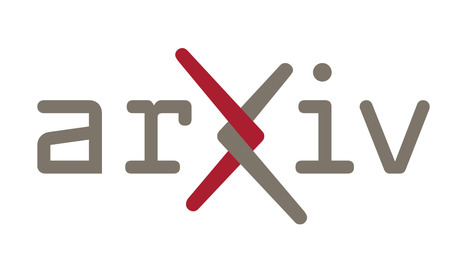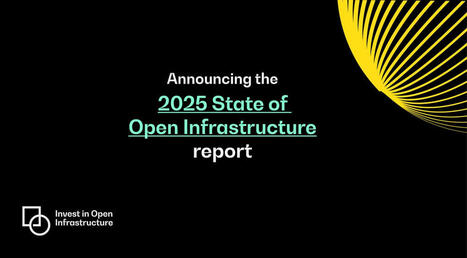 Your new post is loading...
 Your new post is loading...

|
Scooped by
heather dawson
July 11, 4:23 AM
|
Data rescue project new website DRP Portal— over 1,000 datasets rescued from American government depts and agencies by volunteers. Lok by dept and dataset and theme

|
Scooped by
heather dawson
July 2, 3:30 AM
|
Evaluating and prioritising artificial intelligence projects A guide for better decision making and investment outcomes 1 Jul 2025 Publisher

|
Scooped by
heather dawson
June 27, 4:05 AM
|
How NHS communications professionals are adopting AI tools and what is needed to enable safe, ethical and confident use.

|
Scooped by
heather dawson
June 19, 4:13 PM
|
This document brings together the main advances driven by AI, a powerful tool that offers practical solutions for university faculty, students, researchers, and academic institutions

|
Scooped by
heather dawson
June 12, 11:24 AM
|
This paper evaluates the performance of six open-weight LLMs (llama3-8b, llama3.1-8b, gemma2-9b, mixtral-8x7b, llama3-70b, llama3.1-70b) in recommending experts in physics across five tasks: top-k experts by field, influential scientists by discipline, epoch, seniority, and scholar counterparts. The evaluation examines consistency, factuality, and biases related to gender, ethnicity, academic popularity, and scholar similarity. Using ground-truth data from the American Physical Society and OpenAlex, we establish scholarly benchmarks by comparing model outputs to real-world academic records. Our analysis reveals inconsistencies and biases across all models. mixtral-8x7b produces the most stable outputs, while llama3.1-70b shows the highest variability. Many models exhibit duplication, and some, particularly gemma2-9b and llama3.1-8b, struggle with formatting errors. LLMs generally recommend real scientists, but accuracy drops in field-, epoch-, and seniority-specific queries, consistently favoring senior scholars. Representation biases persist, replicating gender imbalances (reflecting male predominance), under-representing Asian scientists, and over-representing White scholars. Despite some diversity in institutional and collaboration networks, models favor highly cited and productive scholars, reinforcing the rich-getricher effect while offering limited geographical representation. These findings highlight the need to improve LLMs for more reliable and equitable scholarly recommendations.

|
Scooped by
heather dawson
June 12, 11:23 AM
|
In the aftermath of the “AI boom,” this report examines how the push to integrate AI products everywhere grants AI companies - and the tech oligarchs that run them - power that goes far beyond their deep pockets.

|
Scooped by
heather dawson
June 12, 9:11 AM
|
This ILO Working Paper refines the global measurement of occupational exposure to generative AI by combining task-level data, expert input, and AI model predictions. It offers an improved methodological framework to assess how GenAI may impact jobs across countries and sectors.

|
Scooped by
heather dawson
June 11, 2:48 AM
|
AI can significantly reduce time spent on government tasks. This report describes a trial of 20,000 civil servants in the United Kingdom, showing they could save nearly two weeks each annually by using the technology. It suggests AI tools have the potential to transform productivity and public service delivery at scale.

|
Scooped by
heather dawson
June 1, 3:40 PM
|
Jisc report Over the last two years we have spoken to groups of students to get a broad understanding of the way they view artificial intelligence (AI), and how they are using it, and what their concerns and hopes are. We’ve published two reports, summarising our findings, in 2023 and 2024.

|
Scooped by
heather dawson
June 1, 3:30 PM
|
Presenting the latest insights and trends in open infrastructure characteristics, funding, policy, and community health.

|
Scooped by
heather dawson
May 20, 7:08 AM
|

|
Scooped by
heather dawson
May 15, 3:45 PM
|
The use of chatbots equipped with artificial intelligence (AI) in educational settings has increased in recent years, showing potential to support teaching and learning. However, the adoption of these technologies has raised concerns about their impact on academic integrity, students' ability to problem-solve independently, and potential underlying biases. To better understand students' perspectives and experiences with these tools, a survey was conducted at a large public university in the United States. Through thematic analysis, 262 undergraduate students' responses regarding their perceived benefits and risks of AI chatbots in education were identified and categorized into themes.
The results discuss several benefits identified by the students, with feedback and study support, instruction capabilities, and access to information being the most cited. Their primary concerns included risks to academic integrity, accuracy of information, loss of critical thinking skills, the potential development of overreliance, and ethical considerations such as data privacy, system bias, environmental impact, and preservation of human elements in education.
While student perceptions align with previously discussed benefits and risks of AI in education, they show heightened concerns about distinguishing between human and AI generated work - particularly in cases where authentic work is flagged as AI-generated. To address students' concerns, institutions can establish clear policies regarding AI use and develop curriculum around AI literacy. With these in place, practitioners can effectively develop and implement educational systems that leverage AI's potential in areas such as immediate feedback and personalized learning support. This approach can enhance the quality of students' educational experiences while preserving the integrity of the learning process with AI.

|
Scooped by
heather dawson
May 14, 7:13 AM
|
|

|
Scooped by
heather dawson
July 8, 4:14 AM
|
Public attitudes to public sector AI

|
Scooped by
heather dawson
June 27, 3:22 PM
|
https://lustre-network.net/about/ this project has involved academics, AI specialists, records managers ,museum and archives roles to explore the potentials of AI in their sector in the future the website provides free access to their publications and workshop outputs including: And a special recent journal article collection according to the project ‘This collection demonstrates the transformative role of AI in advancing archival practices across government and GLAM sectors. The articles showcase how AI can unlock digital data while considering issues such as bias, privacy, and trust.”.

|
Scooped by
heather dawson
June 19, 4:15 PM
|
By leveraging collective intelligence and scenario planning, strategic foresight exercises can help ensure that AI technologies are developed and deployed responsibly, thereby increasing the likelihood of their positive contribution to sustainable and inclusive growth. Such forward-thinking methodologies are critical to mitigating risks and harnessing AI’s transformative power in advancing the SDGs.

|
Scooped by
heather dawson
June 17, 3:15 AM
|
Digital literacy and inclusion critical to skilling individuals and businesses for success in the age of AI.To ensure individuals, businesses, and communities can thrive in the age of AI, government policy must place inclusion, digital skills, and adaptive regulation at the heart of a thriving, future-ready society.

|
Scooped by
heather dawson
June 12, 11:23 AM
|
To develop a robust policy for generative artificial intelligence use in higher education, institutional leaders must first create "a room" where dive

|
Scooped by
heather dawson
June 12, 9:20 AM
|
An unprecedented look at the state of AI’s energy and resource usage, where it is now, where it is headed in the years to come, and why we have to get it right.

|
Scooped by
heather dawson
June 12, 3:11 AM
|
Research Security Report: Stronger cooperation, safer collaboration: driving research security cooperation across Europe Following on from the event series in 2024 (see details below), the team have released a report based on the findings.

|
Scooped by
heather dawson
June 11, 2:47 AM
|
Mapping the potential: Generative AI and public sector work The Alan Turing Institute | 2 Jun 2025 | Government, Technology This report outlines the findings from assessing the extent to which public sector activities in the United Kingdom are suited for Generative AI (GenAI) use. The findings demonstrate the potential supporting role that GenAI could play in freeing up valuable public sector time. However, its potential to support public sector work activities varies across different sectors.

|
Scooped by
heather dawson
June 1, 3:38 PM
|
Generative artificial intelligence (GenAI) is increasingly used to support a wide range of human tasks, yet empirical evidence on its effect on creativity remains scattered. Can GenAI generate ideas that are creative? To what extent can it support humans in generating ideas that are both creative and diverse? In this study, we conduct a meta-analysis to evaluate the effect of GenAI on the performance in creative tasks. For this, we first perform a systematic literature search, based on which we identify n = 28 relevant studies (m = 8214 participants) for inclusion in our meta-analysis. We then compute standardized effect sizes based on Hedges' g. We compare different outcomes: (i) how creative GenAI is; (ii) how creative humans augmented by GenAI are; and (iii) the diversity of ideas by humans augmented by GenAI. Our results show no significant difference in creative performance between GenAI and humans (g = -0.05), while humans collaborating with GenAI significantly outperform those working without assistance (g = 0.27). However, GenAI has a significant negative effect on the diversity of ideas for such collaborations between humans and GenAI (g = -0.86). We further analyze heterogeneity across different GenAI models (e.g., GPT-3.5, GPT-4), different tasks (e.g., creative writing, ideation, divergent thinking), and different participant populations (e.g., laypeople, business, academia). Overall, our results position GenAI as an augmentative tool that can support, rather than replace, human creativity-particularly in tasks benefiting from ideation support.

|
Scooped by
heather dawson
May 20, 7:10 AM
|
U.S. Copyright Office Releases Prepublication Version of Report on Copyright and Artificial Intelligence Part 3: Generative AI Training

|
Scooped by
heather dawson
May 20, 7:04 AM
|

|
Scooped by
heather dawson
May 14, 7:14 AM
|
|

 Your new post is loading...
Your new post is loading...
 Your new post is loading...
Your new post is loading...




















